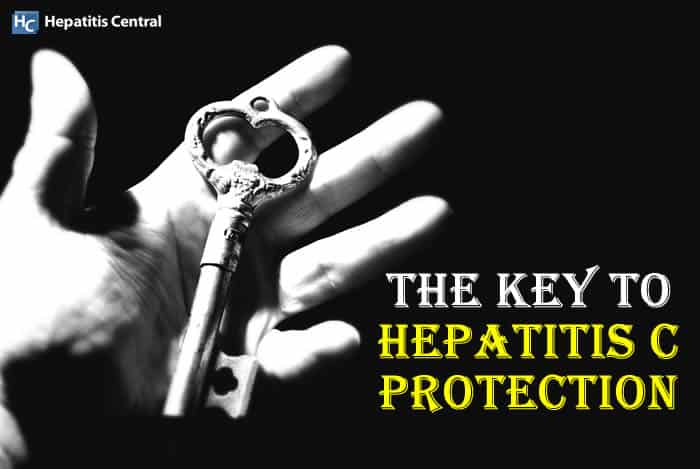The Key to Hepatitis C Protection


The latest generation of direct-acting antiviral drugs is creating a major shift in the outlook of Hepatitis C. Lucky for the estimated 170 million people infected with the Hepatitis C virus worldwide, the new medications have a viral eradication rate in the 90th percentile. This relatively recent medical advancement is big news for the healthcare community, but does not provide protection against acquiring this virus. A Hepatitis C preventative vaccine is not yet a reality, but insight into those who are capable of spontaneously clearing this liver infection may put researchers on the right track.
Of those individuals who are exposed to Hepatitis C, a staggering 85% proceed to a chronic infection – which may result in chronic hepatitis, liver cirrhosis, and even liver cancer. Despite being in the minority, the 15% who are able to clear this virus from their body via their immune system are of great value to understanding how to prevent chronic Hepatitis C infection. Unfortunately, investigations into acute immune responses and spontaneous clearance of the virus are severely hampered by difficulties in identifying vulnerable patients.
Although it is not the only route of infection, injection drug use reigns as the most reliable risk factor for transmitting the Hepatitis C virus. Research into this population has found that a small percentage of long-term injection drug users remain free of the virus – despite prolonged Hepatitis C exposure.
Several studies point towards natural killer (NK) cells as the key to their Hepatitis C protection.
NK cells:
- are specialized lymphocytes (part of the immune system) that provide a first line of defense through their ability to kill pathogen-infected cells and transformed cells.
- are regulated by a fine balance of inhibitory and activating signals, which are mediated by a diverse collection of cell-surface receptors.
- appear to adapt and persist in response to particular viral infections.
- are altered in patients with acute and chronic Hepatitis C infection.
Over the past 12 years, evidence connecting natural killer cell response to chronic Hepatitis C disease has evolved:
- 2005 – A study published in Clinical Gastroenterology and Hepatology found that NK receptors were an important interface that transmits danger signals from abnormal cells to immune systems. They determined that NK cells isolated from patients with chronic Hepatitis C were less capable of killing cancerous liver cells and of producing an immune response than those from healthy donors.
- 2014 – A study published in the Journal of Hepatology examined the relatively small population of injection drug users who exhibited Hepatitis C immunity. They found that sustained NK cell activation contributed to protecting against Hepatitis C infection.
- 2015 – In a review published in Frontiers in Microbiology, it was recognized that we only seem to understand a fraction of the role that NK cells play in the immune response to Hepatitis C. However, this review also touts NK cell research to be a priority in developing a Hepatitis C vaccine strategy.
- 2016 – In an evaluation published in the World Journal of Gastroenterology, investigators acknowledge findings that NK cell responses are important in each phase of Hepatitis C infection, and that in the early phase, NK cells are involved in protective Hepatitis C immunity. Here, too, the authors call for more research on the role and functional status of NK cells in Hepatitis C infection.
- 2016 – In a study published in the Journal of Viral Hepatitis, researchers conducted a trial on injection drug users and their results suggest NK cytotoxicity likely contributes to protection from acquiring the Hepatitis C virus.
- 2017 – In a recent study published in the Journal of Viral Hepatitis, researchers identified a group of blood recipients who remained uninfected despite large-dose exposure to Hepatitis C-contaminated blood. Upon characterizing what immune factors might confer this protection, they found enhanced NK cell activation and killing, with weak Hepatitis-specific T cell responses in uninfected recipients. They surmised that the enhanced NK cell activation and killing contributes to protection from chronic Hepatitis C.
A significant investment into natural killer cells and their activation is necessary before this revelation translates into a Hepatitis C preventative vaccine. Nonetheless, the groundwork has been laid, and this portion of the immune system could be the star ingredient in the vaccine to wipe away the Hepatitis C virus.
https://www.frontiersin.org/articles/10.3389/fmicb.2015.01061/full, NK cell function and receptor diversity in the context of HCV infection, Clair M. Gardiner, Retrieved October 29, 2017, Frontiers in Microbiology, September 2015.
https://www.ncbi.nlm.nih.gov/pmc/articles/PMC4721979/, Natural killer cells in hepatitis C: Current progress, JC Yoon, et al, Retrieved October 29, 2017, World Journal of Gastroenterology, January 2016.
https://www.ncbi.nlm.nih.gov/pubmed/16234066, Natural killer cells in hepatitis C virus infection: from innate immunity to adaptive immunity, Takehara T, et al, Retrieved October 29, 2017, Clinical Gastroenterology and Hepatology, October 2005.
https://www.ncbi.nlm.nih.gov/pubmed/24845613, Protection against hepatitis C infection via NK cells in highly-exposed uninfected injecting drug users, Sugden PB, et al, Retrieved October 29, 2017, Journal of Hepatology, October 2014.
https://www.ncbi.nlm.nih.gov/pubmed/26833632, Natural killer cells in highly exposed hepatitis C-seronegative injecting drug users, Mina MM, et al, Retrieved October 29, 2017, Journal of Viral Hepatitis, June 2016.
https://www.ncbi.nlm.nih.gov/pubmed/29063663, Enhanced natural killer cell activity is found in exposed uninfected recipients of hepatitis C-contaminated blood, Ow MM, et al, Retrieved October 29, 2017, Journal of Viral Hepatitis, October 2017.







